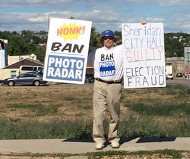10/24/2017
Colorado Court Denies Public Vote On Speed CamerasLegal technicality allows Sheridan, Colorado once more to block the public from voting on the future of speed cameras.

There will be no public vote on the future of speed cameras in Sheridan, Colorado -- for now. The state Court of Appeals on Thursday refused to give the town's resident a say in whether automated ticketing machines are used in their community because the group Ban It Sheridan by a few days missed a technical deadline for challenging the city clerk's maneuver that kept the issue off the ballot.
Last year, Ban It Sheridan succeeded in collecting enough signatures to force a vote, but Xerox (now known as Conduent) and the city of Sheridan came up with a way to throw out just enough signatures to keep the petition from qualifying.
"Fortunately voter fraud is incredibly rare," the group said on its Facebook page in frustration at the initial blocking of the vote. "Unfortunately the most common voting misconduct comes in the form of voter suppression from our very own government leaders, as we are experiencing in Sheridan."
The group had 28 days to challenge the city clerk in court, but the group filed its challenge 35 days later. The members petitioned the court for leniency since they were ordinary citizens going up against a powerful team of lawyers from a Fortune 500 company, and a constitutional right should not be denied on such a technicality. The three-judge appellate panel was not persuaded.
"We begin by observing that plaintiffs' pro se status doesn't affect our analysis," Judge Jerry N. Jones wrote for the panel. "No Colorado appellate decision has addressed the precise issue before us -- whether a generally applicable, jurisdictional deadline may be unconstitutional when applied to parties seeking to exercise a constitutional right. But analogous case law establishes the general principle that the state may impose reasonable time limits on the exercise of a constitutional right."
The judges pointed to statutes of limitation that prevent citizens from bringing court cases to defend constitutional rights after a certain time limit has expired.
"So long as such a time limit doesn't unduly burden the exercise of a constitutional right, it is permissible," Judge Jones concluded. "Plaintiffs haven't shown that the twenty-eight day deadline imposed by Rule 106(b) unduly burdens their constitutional right of initiative."
Earlier this year the group asked the city clerk for copies of all department emails mentioning the initiative or signatures. The clerk responded by saying it would only produce the records if the group paid $19,740 for the cost to conduct the search (view response in PDF).
A copy of the ruling is available in a PDF file at the source link below.


